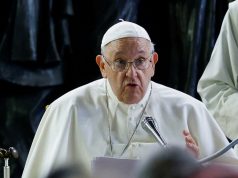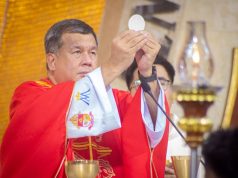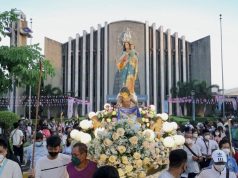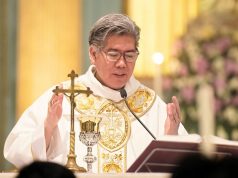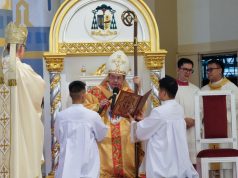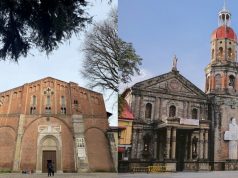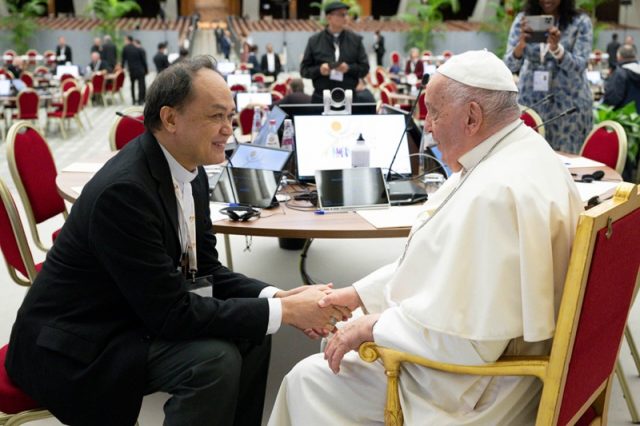
VATICAN (Updated Nov. 3, 2024; 9:51 a.m.) — Bishop Pablo Virgilio David of Kalookan has been elected to a 17-member council tasked with implementing the synodality process and preparing for the next synod—an indication of the cardinal-elect’s growing role in the universal Church.
David, head of the Philippine delegation to the 16th Ordinary General Assembly of the Synod of Bishops, which will wrap up its second and final session this week, was elected by delegates during the Vatican meeting’s 15th General Congregation on Wednesday afternoon, according to the Holy See Press Office.
He will represent Asia in the Ordinary Council of the synod’s general secretariat along with a top Indian prelate, Cardinal Filipe Neri Ferrão, the archbishop of Goa and Damão.
David and Ferrão lead their respective bishops’ conferences. In February, Ferrão was elected president of the Federation of Asian Bishops’ Conferences (FABC), with David as vice president. They will formally assume their new roles in January 2025.
Last year, during the first session, David was elected to the synod’s Commission on Information.
The Apostolic Constitution Episcopalis Communio states that the “Ordinary Council of the General Secretariat is competent for the preparation and implementation of the Ordinary General Assembly.” It is composed mostly of diocesan bishops representing geographical areas.
Members of the Ordinary Council begin their terms at the conclusion of the Ordinary General Assembly during which they were elected. They become members of the next Ordinary General Assembly, at the end of which their mandates will cease.
In a change made by Pope Francis, the number of council members went up to 17, with 12 elected by the assembly. The pope will appoint four more members and the head of a Vatican dicastery whose work relates to the theme of the next synod.
Under the new synod instruction, the composition of the elected council members is as follows: one from the Eastern Catholic Churches, one from Oceania, and two each from North America, Latin America, Europe, Africa and Asia.
The full list of the new council members:
Eastern Catholic Churches
1. His Beatitude Youssef Absi, Patriarch of Antioch of the Greek Melkites, Head of the Synod of the Greek Melkite Catholic Church
Oceania
2. Most Rev. Msgr. Timothy John Costelloe, S.D.B., Archbishop of Perth (Australia)
North America
3. Most Rev. Msgr. Daniel Ernest Flores, Bishop of Brownsville (United States of America)
4. Most Rev. Msgr. Alain Faubert, Bishop of Valleyfield (Canada)
Latin America
5. Most Rev. Card. Luis José Rueda Aparicio, Archbishop of Bogotá (Colombia)
6. Most Rev. Msgr. José Luis Azuaje Ayala, Archbishop of Maracaibo (Venezuela)
Europe
7. Cardinal Jean-Marc Aveline, Archbishop of Marseille (France)
8. Msgr. Gintaras Grušas, Archbishop of Vilnius (Lithuania)
Africa
9. Cardinal Dieudonné Nzapalainga, C.S.Sp., Archbishop of Bangui (Central African Republic)
10. Msgr. Andrew Fuanya Nkea, Archbishop of Bamenda (Cameroon)
Asia
11. Cardinal Filipe Neri António Sebastião do Rosário Ferrão, Archbishop of Goa and Damão (India)
12. Msgr. Pablo Virgilio S. David, Bishop of Kalookan (Philippines)
At the end of the 15th Ordinary General Assembly in 2018, synod fathers elected 16 council members, whose mandates conclude at the end of the 16th assembly on Oct. 27:
1. Ignace Youssif III Younan, Patriarch of Antioch of the Syrians, Head of the Synod of the Syriac Catholic Church (Lebanon)
2. Cardinal Christoph Schönborn, O.P., Archbishop of Vienna (Austria).
3. Cardinal Oswald Gracias, Archbishop of Bombay
4. Cardinal Gérald Cyprien Lacroix, I.S.P.X., Archbishop of Quebec, (Canada).
5. Cardinal Charles Maung Bo, S.D.B., Archbishop of Yangon (Myanmar).
6. Cardinal Daniel Fernando Sturla Berhouet, S.D.B., Archbishop of Montevideo (Uruguay).
7. Cardinal Dieudonné Nzapalainga, C.S.Sp., Archbishop of Bangui (Central African Republic).
8. Cardinal Sérgio da Rocha, Archbishop of Brasilia (Brazil).
9. Cardinal Joseph William Tobin, C.SS.R., Archbishop of Newark (United States of America).
10. Cardinal Juan José Omella Omella, Archbishop of Barcelona (Spain).
11. Cardinal Joseph Coutts, Archbishop of Karachi (Pakistan).
12. Cardinal Matteo Maria Zuppi, Archbishop of Bologna (Italy).
13. Archbishop Gabriel Mbilingi, C.S.Sp., Archbishop of Lubango (Angola).
14. Archbishop Anthony Colin Fisher, O.P., Archbishop of Sydney (Australia).
15. Archbishop Jaime Calderón Calderón, Bishop of Tapachula (Mexico).
16. Msgr. Andrew Fuanya Nkea, Archbishop of Bamenda (Cameroon).
The 16th assembly, which began its work in 2021, held global consultations carried out at the parish, vicariate, diocesan, national, and continental levels, and convened two sessions at the Vatican.
Its goal was to establish a “synodal process” in the Church to make it more consultative, discerning, and accountable. “Synodality” refers to the idea of walking or journeying together as the “People of God” in mission.
The synod, historically a domain of bishops, is unprecedented as lay delegates accounted for about a quarter of the total, and women were given voting powers for the first time.
Delegates are expected to vote Saturday afternoon on the final document containing recommendations, which the pope may adopt in a post-synodal apostolic exhortation.
More than a thousand amendments, or modi were submitted to the synod secretariat before the Wednesday deadline, with 900 proposed by the assembly’s small groups and about a hundred from individuals, according to the Holy See Press Office.
Pope Francis will close the synod with a Mass in St. Peter’s Basilica on Sunday, Oct. 27.




